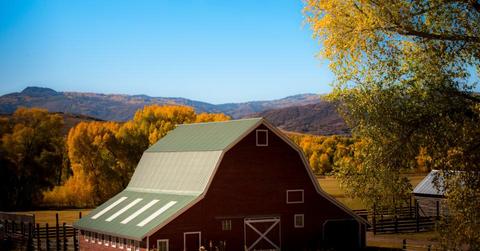Organic Valley Makes Commitment To Use 100% Renewable Energy
Organic Valley, the largest organization of organic farmers in the United States, is planning to source 100 percent of its electricity from renewable energy. The company plans to meet their goal by 2019 through the use of solar power.
Updated May 22 2019, 10:24 a.m. ET
According to the United States Energy Information Administration, agricultural activity requires a huge amount of energy consumption. Farms tend to use diesel or propane to work the land, while indirect actions like manufacturing pesticides also take up significant energy. As a result, the farming industry can have a substantial carbon footprint.
Organic Valley, the largest organization of organic farmers in the United States, has recently stepped up to lessen the impact of farming and created a plan to source 100 percent renewable energy. The company will harness solar energy to hit their new goal, and in the process, they’ll become the world’s largest food company to run entirely on renewable energy.
Organic Valley was established in 1988 and operates on a farmer-owned cooperative business model. Since the beginning, the organization was built to help family-run farms survive and produces organic food like milk and eggs. Today, Organic Valley works with 2,000 family farms which cover about 4,000 acres of organically farmed land. Through its goal to become carbon neutral, the company’s new energy target would have a widespread impact across the country with farms in 36 states.
To take this step, Organic Valley plans to meet it’s renewable energy goals through a partnership with two other groups. Together with the Upper Midwest Municipal Energy Group (UMMEG) and OneEnergy Renewables, Organic Valley hopes the new solar collaboration will generate a surplus of renewable energy by 2019.
These partners will team up to build solar installations in Wisconsin. UMMEG provides services such as buying cost-efficient energy while OneEnergy Renewables is a B Corporation which develops solar energy projects across the country. The solar installations will help Organic Valley's sustainability goals by having pollinator-friendly habitats built into the design to create environments for bees and butterflies.
Organic Valley’s CEO, George Siemon believes new developments like these are key for the farming industry to evolve and grow. "Our future demands bold new thinking about our sources of energy, and there is nothing more natural to a farmer than harnessing the power of the sun and the wind. So our cooperative is committed to achieving 100 percent renewable power, and doing it in partnership with the rural communities where we live and work," he said.
While this new move would make Organic Valley a uniquely sustainable organization, the company has a long track record of sustainable leadership. The group has previously taken steps to encourage eco-friendly initiatives by creating wind farms for electricity, implementing biodiesel usage, and avoiding pesticides or synthetic fertilizers. They also have a regional distribution model where they sell milk in the same area where it is farmed to minimize carbon emissions and support local businesses.
With this new move towards 100 percent renewable energy, the Organic Valley team hopes to set a new standard for other companies. The company’s head of sustainability, Jonathan Reinbold expresses his optimism for this partnership:
“Organic Valley was built on an environmental ethic, promoting ecological and economic sustainability. As leaders in food and farming, it is our responsibility to pioneer change for good. Our hope is that this partnership to install community-scale solar will be replicated by municipal utilities around the country and propel more rural communities toward economic stability and energy independence.”
